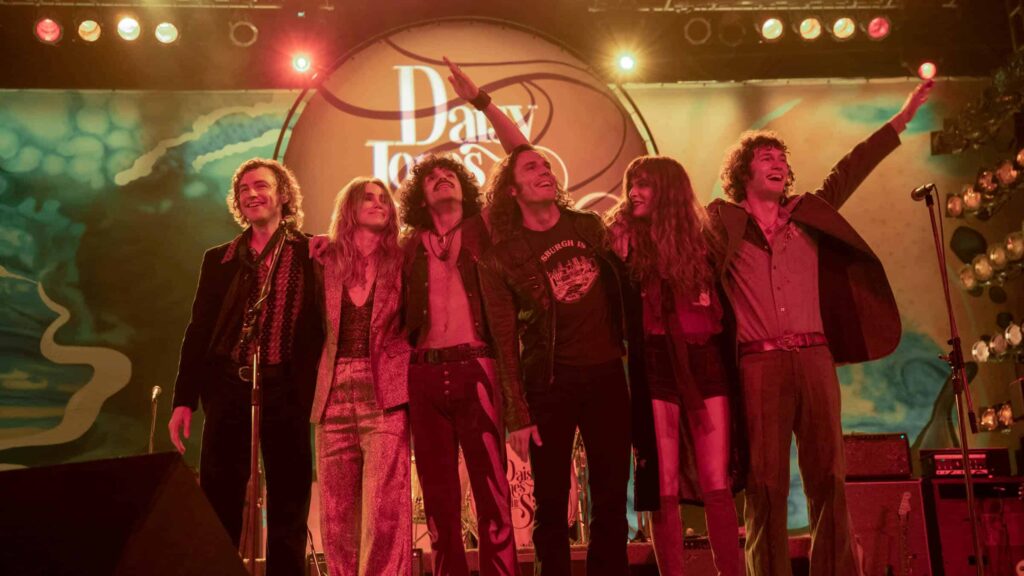Aanji Sin ’24
Editor in Chief
Congratulations, BookTok: Daisy Jones & the Six is reckoned to be the first big hit series of the year, and YA romance fans all over the world couldn’t be happier. Adapted from Taylor Jenkins Reid’s best selling 2019 novel, Daisy Jones & the Six follows the fictional meteoric rise and fall of one of the biggest bands of the seventies, sublimely nostalgic and deliciously melodramatic.
The first three episodes hit Prime Video on March 3, and the rest of the miniseries will release in batches with the last of the 10 parts coming out on March 24. The show follows the format of the novel, written as an interview transcription, and synthesizes the recollections of the band members and closely related parties for sit down interviews 20 years after their dissolution to talk about what fell apart at the height of their musical careers.
It’s a perfect set up for a television adaptation and the show succeeds with it, showing play-by-play what really happened between the lines of the band members’ vague approximations of the truth. It scratches the exact spot that the book just doesn’t — sometimes, all the audience needs to know is written right on the characters’ faces.
There are a few standout performances from the main cast; Riley Keough steals her scenes as the titular Daisy Jones and imbues the burgeoning rock star with the perfect mix of insecurity covered with bluster and a plucky frenetic energy that you can’t help but root for. Alongside her, Camila Morrone’s Camila Dunne leans into independence and critical feminine strength for the fan favorite character.
However, what the television adaptation does best is breathe fresh life into other underused characters from the novel. Bassist Eddie Roundtree’s (Josh Whitehouse) discontent towards arrogant frontman Billy Dunne (Sam Claflin) is given a stronger, more logical foundation for what will eventually aid in the band’s dissolution in the near future. Furthermore, drummer Warren Rhodes (Sebastian Chacon) is the bit of comic relief that isn’t dependent on misogyny and much needed in the show’s torrent of brooding and existentialism. Nabiyah Be’s “disco pioneer” Simone Jackson, companion to Daisy, also lends some needed diversity to an otherwise whitewashed cast of heterosexuals and earns a much-deserved spotlight on her own career growth.
Daisy Jones & the Six can be quintessentially summed up in one quote from Billy Dunne: “Same old rock ’n’ roll story. The drinking, the drugs, the loneliness.” The elements of the story are well-worn cliches of this vein — and very evidently Fleetwood Mac inspired. However, the first three episodes covering the story’s exposition don’t do enough to deliver on that sentiment. It fails at digging up that ugly, scaled underbelly of the story’s heart; what the seventies rock n’ roll scene did to its young impressionable stars; what the book doesn’t shy away from: addiction, infidelity, sexual assault, parental trauma, and much more. Issues are addressed at a safe distance from the camera which instead casts a romanticized veil over what could have been impactful messages to spread, and just generally made for better television.
And while this might be a point of contention with fans of the novel, the show hasn’t quite hit the nail on the head of what is one of Daisy Jones & the Six’s most compelling aspects: that these people suck. Not to spoil too much of what’s to come, but Daisy Jones is not supposed to be a good person — neither is Billy, nor most of the other band members (but you can leave Karen Sirko out of this). The entire plot of the story pretty much hinges upon this fact.
And that’s the beauty of Daisy Jones, both the fictional seventies icon and the story itself. She sucks, and yet you love her. You fall for her just like everyone else does. And while Keough’s Daisy and Claflin’s Billy have their high points, they haven’t plummeted to their lows quite as severely as expected. Here’s to hoping that the rest of the series packs a harder punch.
Episodes one through three of Daisy Jones & the Six are now streaming on Prime Video, and episodes four through six drop this Friday, March 10.
Image Source: GQ Italia



